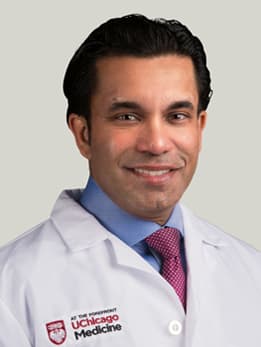UChicago Medicine first in state to offer novel super-saturated oxygen therapy to patients with ‘widowmaker’ heart attacks

The University of Chicago Medicine is the first medical center in Illinois to offer a novel treatment to patients with large, anterior heart attacks affecting the front side of the heart. These cardiac events are colloquially known as “widowmakers” due to their high mortality rates. Super-saturated oxygen (SSO2) therapy is the first and only FDA-approved therapy shown to reduce muscle damage in heart attack patients after successful catheter-based intervention.
Heart attacks occur when the flow of blood and oxygen to the heart is completely cut off due to a blocked coronary artery. In many cases, even if catheter-based interventions such as angioplasty and stenting lead to quick restoration of blood flow, the heart muscle is still irreversibly damaged, leaving patients with heart failure. SSO2 therapy after coronary intervention delivers localized, super-oxygenated blood to improve microvascular blood flow and reduces damage to the blood vessels and downstream heart muscle.
SSO2 therapy has been shown in multiple randomized prospective clinical trials to consistently and safely reduce damage and scarring (infarct size) in anterior heart attack patients. Decades of research on heart attack patients has demonstrated that infarct size reduction is correlated with improved survival and left ventricular function as well as decreased risk for heart failure.
The treatment delivers hyperoxemic levels of dissolved oxygen — seven to 10 times normal levels — directly to the damaged heart muscle once the coronary artery is successfully opened. It is indicated for patients who are treated within six hours of symptom onset for the most serious kind of heart attacks, left anterior descending ST-elevation myocardial infarction.
“Although the interventional approach to treating heart attacks has continuously been refined over the past several decades, the long-term prognosis for patients with large, anterior heart attacks has not improved in a commensurate fashion,” said Sandeep Nathan, MD, MS, Associate Professor of Medicine, Co-Director of the Cardiac Catheterization Laboratory and Director of the Cardiac Intensive Care Unit at UChicago Medicine. “We are pleased to lead the way in Illinois with what seems to be a very promising, new treatment for some of the highest-risk patients we routinely see in the cardiac catheterization lab.”
SSO2 therapy, branded as TherOx, was developed by California-based ZOLL.
Heart attacks occur when the flow of blood and oxygen to the heart is completely cut off due to a blocked coronary artery. In many cases, even if catheter-based interventions such as angioplasty and stenting lead to quick restoration of blood flow, the heart muscle is still irreversibly damaged, leaving patients with heart failure. SSO2 therapy after coronary intervention delivers localized, super-oxygenated blood to improve microvascular blood flow and reduces damage to the blood vessels and downstream heart muscle.
SSO2 therapy has been shown in multiple randomized prospective clinical trials to consistently and safely reduce damage and scarring (infarct size) in anterior heart attack patients. Decades of research on heart attack patients has demonstrated that infarct size reduction is correlated with improved survival and left ventricular function as well as decreased risk for heart failure.
The treatment delivers hyperoxemic levels of dissolved oxygen — seven to 10 times normal levels — directly to the damaged heart muscle once the coronary artery is successfully opened. It is indicated for patients who are treated within six hours of symptom onset for the most serious kind of heart attacks, left anterior descending ST-elevation myocardial infarction.
“Although the interventional approach to treating heart attacks has continuously been refined over the past several decades, the long-term prognosis for patients with large, anterior heart attacks has not improved in a commensurate fashion,” said Sandeep Nathan, MD, MS, Associate Professor of Medicine, Co-Director of the Cardiac Catheterization Laboratory and Director of the Cardiac Intensive Care Unit at UChicago Medicine. “We are pleased to lead the way in Illinois with what seems to be a very promising, new treatment for some of the highest-risk patients we routinely see in the cardiac catheterization lab.”
SSO2 therapy, branded as TherOx, was developed by California-based ZOLL.

Sandeep Nathan, MD
Dr. Sandeep Nathan is a highly skilled cardiologist who specializes in interventional cardiovascular procedures.
Learn more about Dr. NathanCoronary Artery Disease and Chest Pain
The University of Chicago Medicine has assembled one of the nation's finest teams of heart experts who specialize in diagnosing and treating all aspects of coronary artery disease. From treatments to alleviate chest pain to rescuing the heart after heart attack, our teams of specialists are always available to offer the finest care.
Read about our diagnostic and treatment options